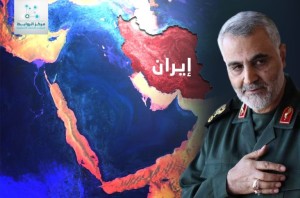Commander of the Quds Force of the Iranian Revolutionary Guards(IRGC) Qassem Suleimani threatened in a speech a few days ago in the Iranian city “Kerman” preventing the reformist movement and political dissidents who reject the Iranian regime ‘interference to the Arab affairs from holding any position in the government system , the agency “Al-Mashreq” belong to the Guard Revolutionary, quoted of Qassem Soleimani as saying: “the people who have chanted in 2009 and here ,he means the reformist ‘s movement – the slogan” Neither Gaza, nor Lebanon, my spirit is as a sacrifice for Iran” , can not be in any political office, or to be at the top of the major decision makers in the country ” . For his part, the Deputy Chief of Staff of the Iranian Armed Forces, Gen. Masoud Algerian, in March 8 , threatened to send the Iranian forces to Yemen to help the Alhutheen , like the Iranian regime’s support of Syrian President Bashar al-Assad in the face of the legitimate rights of the Syrian people.
these statements from the security and military symbols in the Iranian regime to establish a state of ongoing rivalry and hostility with the Arab countries, especially the Arab East, led by Saudi Arabia, noting that it is to persist in dealing with the Arab states with the logic of Iran’s revolution, and not with Iran’ s state. . hostile Statements by those symbols are not consistent with the results of the Iranian elections, “the Shura Council, the Council of the leadership of experts, which came in favor of the reformist movement in the Iranian regime, this is to demonstrate that Iran’s behavior , which is based on blatant interference in the affairs of Arab countries, is still going on, although the importance of the parliamentary elections in setting the domestic and foreign policies in the democratic system , but it is not like this in the Iranian regime, because this regime ruled by the establishment of the Supreme Leader Ali Khamenei , he is the one who draws the internal and foreign policy of the Iranian regime and not the Iranian President Hassan Rowhani and Foreign Minister Javad Zarif. The various periodic elections and the post of president of the republic do not touch the contents of the democratic system in the case of the Iranian regime as far as expressing its forms.
With these remarks , Iran’s revolution is similar with Iran ‘s Al-shah during the rule of Mohammad Reza Pahlavi, in terms of their desire to control the political decision-making in the Middle East and especially in the Arab Gulf states, but there are a fundamental difference in dealing with the Arab countries, despite the intense hostility with those countries , but the hostility and expression levels differed in the case of Iran- Al-shah from Iran- revolutionary. in the first case , the hostility was of a political nature between Iran, Mohammad Reza Pahlavi and the Arab countries, especially the Gulf countries , and did not slip into the security level in the sense that the Shah of Iran was not working on establishing sleeper cells in the Arabian Gulf to hit the stability of the countries as it did not contribute to the establishment of political parties that to contribute to the fragmentation of the national fabric as Iran- revolution did, when Hezbollah was founded in the past eighties century under the pretext of the fight against Israel, and today Hezbollah, which its leader Hassan Nasrallah boasts of being as a soldier of wali al-Faqih, fighting on behalf of its project in Syria.
Not to mention of the dozens of militias which were founded by the Iranian regime in Iraq in the post – Saddam Hussein, for easy control of it, as well as dormant cells deployed in the Arabian Gulf countries, especially in the states of Kuwait and Bahrain, which their security services , from time to time , arrest some of them, Perhaps the most recent was Hezbollah cell in Kuwait. In this context , we can say that Iran’s revolution was not only in the case of political hostility with the Arab countries as it was the case with Iran “Mohammad Reza Pahlavi”, but also went beyond than that to the security hostility and threatening its stability through the negative employment to the Shia Arabs in the Levant countries to be a tool that it operates according to the principle of velayat – e faqih.
The statements of the security official Qassem Soleimani and the military official Masoud Algerian in the Iranian regime did not establish to the relations based on good neighborliness with the Arab countries, it is an aggression on that neighborhood, and is a clear violation of the divine heavenly laws especially the Islamic ones since the Iranian regime takes it as a source to its rule, as it is a violation of the principles of the United Nations (UN), which calls for countries in the international community not to interfere in the internal affairs of States.
In conclusion we can say that the statements of Iranian officials are fallen in the context of the arrogant statements of the Iranian state ( Astkabarih statements) that falsely claims that it has shown enmity toward , from the revolution and to the present day , the USA as a “global’ s arrogance ,” (AL-Istkbar Al-Alami) while in fact practicing the same policies against the Arab states. But the difference is that “Iran – revolution sees in the US a state of global arrogance, while the Iranian regime from the Arab point of view and based on negative practices of that regime over the Arab countries, is a state of regional ‘s arrogance. This arrogance inevitably will disappear in one day due to internal or external factors.
Rawabet Center for Research and Strategic Studies

